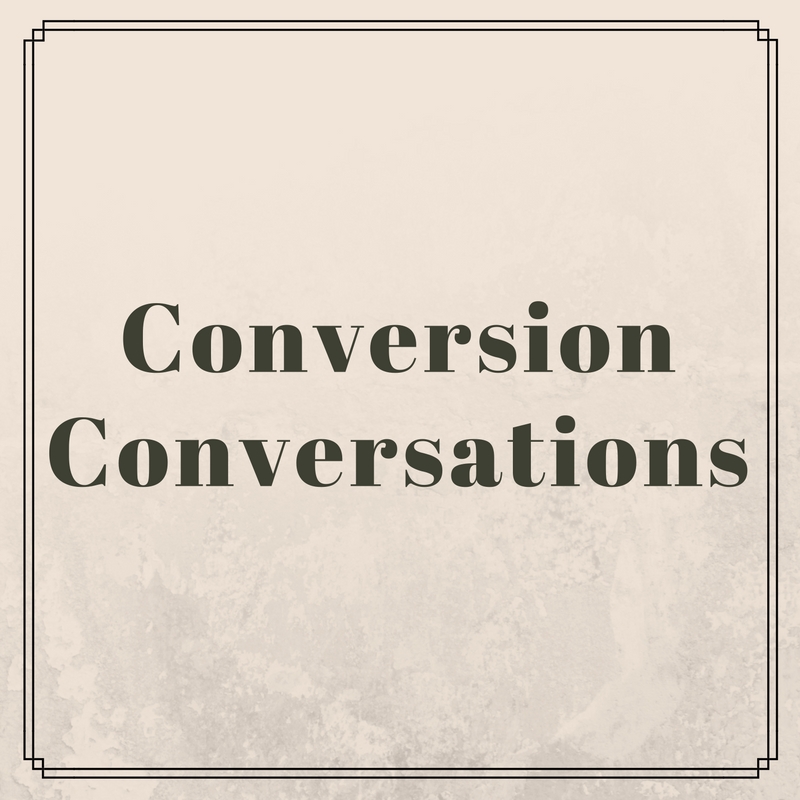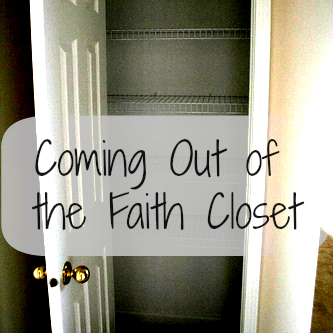“Why do you want to convert?”
I sit at the table across from my mother-in-law, her face revealing a lively eagerness in what she thought would be my answer. She had things to say in response, and awaited my answer with visible excitement. Surely I had an answer she could refute! I responded that I was still in the process and that it was something I’d always longed to do. In turn, she joyfully expounded the virtues of the messianic principles found in Genesis as if they were self-evident. I quickly bowed out of that conversation.
My parents were a little better, but not much. My father wondered why I couldn’t be a “messianic jew”. When I replied that messianic judaism was just Christianity, he shrugged and moved on. Somehow, it seemed incomprehensible to them that I could know the scriptures and say that Jesus wasn’t the messiah. But still, they ask why.
I’ve come to the conclusion that many people don’t actually want to hear the true why, but something they can use for themselves and their ends. Why do you want to convert? is a question they can’t help asking. Why would anyone convert? Did my parents somehow fail me? Was I broken? Who gave me kool-aid to drink that would make me do such a strange thing?
That’s the question they want to ask, but not what anyone does.
The Question
People are fascinated with this question of why no matter what religion the convert comes from or moves to. My husband, an atheist and former Christian, is fascinated because he doesn’t see the point of religion. My in-laws are fascinated because they’re a preacher family who can’t fathom how someone who knows the Christian Bible backwards and forwards can still “reject” Jesus. My peers are curious, either because they’ve wanted to convert themselves or they enjoy a philosophical debate. (Or they wish that I remain a Christian. There’s that too.)
As an aside, my reading and philosophical shifts are such that I no longer read the Bible in a Christian way. I no longer read verses as I have been taught to read them, but as they are within the context I understand them. So I could no more go back to Christianity than anyone else foreign to the religion; it’s probably harder for me since I am now immune to its line of persuasion. But that’s a topic for another day.
The question remains, though: why would anyone convert to any other religion? Or de-convert, as I’ve talked about in the past? It’s a simple question with a not-so-simple answer.
Counting the Reasons
There are many reasons people give for conversion, usually relating to a deep unhappiness of some sort. For those who become Christians, it’s the sense of belonging, the “hole in their heart”, and the desire to fix what they see as a broken life. For those who convert to paganism, it could be a dissatisfaction with the entirety of their Christian upbringing and with the lack of ritual of evangelical Christianity. They desire to move to a religion that is self-determined and kind.
For converts to Judaism, the two most common reasons are marriage or heritage. The third is the idea that one should have been Jewish all along. “Having a Jewish soul,” they call it. The idea that one was born into the wrong religion. It’s a nagging feeling that causes your heart to physically ache when you think about where you’re supposed to be, even though it’s a bit illogical and makes no sense.
For people like me, it started in childhood. I was utterly fascinated with the “old testament” and books like Psalms, Proverbs, Ruth, Job… I even read the ones no one else read, like Malachi and Leviticus. I was utterly transfixed with the deity in those books, and in the way that the religion seemed so different. David talks about playing drums and rejoicing! And here my church vilified drums and guitars – mere inanimate objects – as inherently evil. And how could wine have been okay, but now it’s not? Or sacrifices acceptable, but somehow the rules changed? It seemed strange to me that the creator of a universe would somehow switch everything halfway through, as if he didn’t know what he was doing the first time.
Which brings me to another point: I was not utterly dissatisfied with my Christian upbringing. I loved going to church, hearing sermons, and reading my Bible. I loved debating theology, too, but that was discouraged if it went outside the box. (Why would a creator allow me to have logic, but not the allowance to exercise it?) The things I disliked, such as the then mistreatment of divorced people or those with mental illness, were annoyances but not something that I didn’t think could be fixed. What finally moved me from annoyed to questioning were the illogical things I couldn’t put together. The mismatched readings in the gospels. The verses that didn’t seem to mean what I was told they meant. The research I did into why Jews didn’t believe in Jesus, which had nothing to do with an entire people having their head in the sand or veils over their eyes and everything to do with logic and an unchanging definition of a messiah and of the soul.
Beyond the Logic
But in order to go through with something as life-altering as conversion, one must have a guiding principle beyond logic, one that stems from the heart and soul and not from the head. Well, Judaism more than most religions allow for a foundation of logic, but that’s not enough to fuel a journey into an entirely new community or continue when things get tough.
I mean, it’s hard to convert, right? You are changing yourself in all aspects – how you live, how you dress, how you eat, where you worship, when you worship, who you call friends. Sometimes political choices are changed based on new religious affiliation and guiding principles. So to convert is not as easy as “believing something else”. At least not in Judaism. Judaism is a religion of orthopraxy – the right action. Christianity is one of orthodoxy- the right belief. The Jewish people is known for what they do more than what they believe. (Which is how Christianity came to be, I think. A bunch of Roman pagans who knew nothing of proper Jewish belief were led into thinking they were following in line with the Jews. But that’s another post for another day.)
For me, the nagging that I am not where I should be is hard to ignore. It’s something others have voiced as well, although quietly. It’s hard to explain to someone else. I’m not an emotional or romantic person and to say that my soul clings to the Jewish people is odd for me. How do I explain such a wishy-washy, fluffy thing even to myself, let alone someone else? It just is.
If logic were all that guided me, I’d be a Noahide. Believe correctly, support the Jewish people, move on. Easy. My heart says that’s not enough. My head isn’t as picky. In the end, that’s why people go ahead and convert to Judaism. Orthodox Jews will say, “just be a Noahide! It’s hard to convert.” As if logic would sway someone with a soul like mine. When our heart and our lost soul is compelling us to return home, no logic can sway us. That’s why people convert to Judaism despite the risks and even despite protestations. I believe it’s why people did it in the past. Look at Ruth.
I think it’s why anyone converts to any religion. And looking for logical answers to an illogical thing is a bit pointless. It’s an interesting question to ask, but not one that is satisfying for either side. The convert doesn’t like the question because he/she doesn’t want to offend the other party. The other party doesn’t like the question because they’re looking for answers they can pick at, not because they actually want to know.
Still, we ask.















